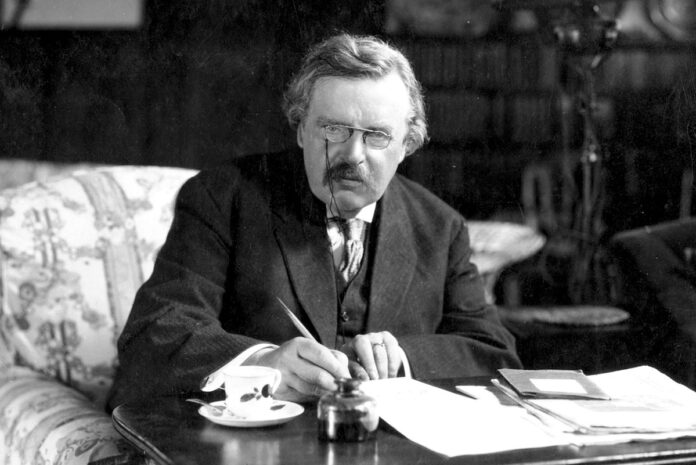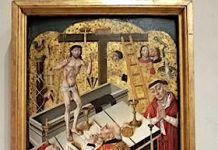What am I doing here? Is this all there is to life?
These questions occasionally surface as I sit at my desk, surrounded by beige walls, buzzing fluorescent lights, and the quiet hum of office routine. My cubicle isn’t bleak or terrible—it just feels… well, repetitive. Get up. Get dressed. Get the kids ready. Work. Commute. Dinner. Dishes. Bedtime. Repeat.
The grown-up in me longs for escape. For something more. Fantasy helps, especially when I can steal a moment in the evening to read. In my case, that moment came after the kids were tucked in and my wife was out running errands. I reached for a book that I hadn’t opened in years, Chesterton’s Orthodoxy, and unknowingly cracked open a portal to a more enchanted way of living.
A Moment of Literary Magic
I was only about twenty minutes into my reread when I stumbled upon a line from chapter four, “The Ethics of Elfland,” that stopped me cold:
“I have said that stories of magic alone can express my sense that life is not only a pleasure but a kind of eccentric privilege.”
That word—privilege—landed like a revelation. Life isn’t just a slog through sameness. It’s a gift. An odd, surprising, hilarious, painful, glorious gift. And it’s precisely the ordinary things—bedtimes, commutes, peanut-butter sandwiches—that hide the deepest wonder.
Chesterton’s whole chapter feels like it was written for tired dads, worn-out moms, and anyone who’s ever sighed at the sight of another unfolded laundry basket.
For Grown-Ups Are Not Strong Enough…
What struck me most was his take on repetition. Chesterton flips the adult view on its head:
“All towering materialism which dominates the modern world rests ultimately upon one assumption… that if a thing goes on repeating itself it is probably dead… But perhaps God is strong enough to exult in monotony. It is possible that God says every morning, ‘Do it again’ to the sun; and every evening, ‘Do it again’ to the moon.”
I’d always seen repetition as drudgery. Wake up, repeat yesterday. But Chesterton sees divine strength in repetition—not boredom, but joy. It’s not that God tires of creation; it’s that He delights in it again and again. Over and over, with childlike glee.
This shook me.
How often had I grumbled at the monotony of my life while my children were exulting in it?
Rediscovering Wonder
My kids teach me this every day. They can watch the same cartoon five times in a row and still laugh. They’ll arrange and rearrange the same Lego bricks into endless new stories. They don’t see the same thing—they see newness in sameness.
Chesterton phrases it this way, “The repetition in Nature may not be a mere recurrence, it may be a theatrical encore.”
The natural world is not reducible to a merely reasoned explanation. And if one’s outlook through the eyes of science alone it is a dreary way to live. “When we are asked why eggs turn to birds or fruits fall in autumn, we must answer that it is magic. It is not a “law,” for we do not understand its general formula. It is not a necessity, for though we can count on it happening, practically, we have no right to say that it must always happen,” Chesterton adds.
There is no such thing as ordinary. Only eyes that grow too dull to see it.
I remember standing with my toddler at the front door, watching him watch my car tires. Just the tires. The little guy was mesmerized. What was I missing? What else have I dismissed as boring that might actually be glorious?
There’s gospel truth there.
What if all the things I try to escape are actually opportunities to encounter the divine? What if running late, mopping up milk spills, and listening to the same bedtime book for the seventh time are not signs of spiritual stagnation but invitations to joy?
Legos, Chalk, and Elfland
In another gem, A Piece of Chalk, Chesterton marvels at the miracle of drawing on brown paper with white chalk:
“I had always vaguely felt facts to be miracles in the sense that they were wonderful: now I began to think them miracles in the stricter sense that they were wilful.”
This reminds me of the diligence my kids take in drawing or creating things. The other day my oldest son was hunched over the kitchen table for hours with paper and pencil. When I got back from work, he proudly told me that he was a cartographer. Not in that plain of language, but he exclaimed, “Look Dad! Here’s a map of Kid-Town!” The fact is when you care about something, you take the time to dedicate to it. To hone it and make it beautiful. That’s the reality Chesterton and my son taught me.
Facts are miracles. Repetition is divine. The world is not dead—it’s enchanted. Not because we escape it, but because we finally see it.
I don’t need to find Narnia, or follow a rabbit down a hole, or leap through Platform 9 ¾ (though I did visit that fictional landmark once during a trip to Europe 😊). The door to Elfland is in my kids’ closet, where Lego men await their next campaign. It’s in the crumbs on our kitchen table and the squeals of laughter echoing off bathtub walls.
The Divine Perspective
The life of children mirrors the life of God. Where adults sigh at sameness, God sings, “Do it again.” Monotony is not weakness. It’s strength. Chesterton reminds me that joy is not about variety, but about vision. Work is not drudgery when you look at it with the lens of love. Life is sacramental and repetitive. Jesus wants you to experience it again. And again.
It’s about embracing the call to be amazed—again.
As I go back to work tomorrow, I pray the Holy Spirit grants me the eyes of a child and the heart of a saint. Let me not curse the repetition of life but enter into it like liturgy. Because in the end, that’s what it is: a daily liturgy of love, work, wonder, and wild grace.
“Perhaps God is strong enough to exult in monotony.”
And perhaps, with a little help from Chesterton and a lot of help from grace, I can be too.












